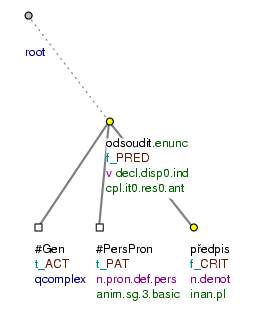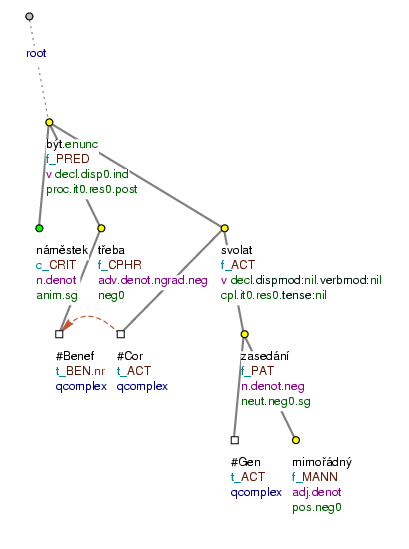- Definition of the
CRITfunctor -
CRIT(criterion) is a functor for such an adjunct that expresses manner by providing a measure or criterion (norm, rule) essential for the measurement, evaluation, classification or recognizing the event (state) etc.
The CRIT functor comprises several meanings, especially:
-
regulation, collection of rules valid for the event.
Examples:
Byl odsouzen v souhlase s předpisy.
CRIT(=He was sentenced in compliance with the regulations) Fig. 7.33Podle regulí.
CRITGATT lze toto opatření přijmout maximálně na dobu šesti měsíců. (=According to the GATT rules, it is possible to take the measure..)Na základě trestního zákoníku.
CRITmu byla přiřknuta jen finanční pokuta. (=On the basis of the Criminal Code, they only imposed a fine on him)Volby neproběhly tak úplně v duchu ústavy.
CRIT(=The election didn't really pass in the spirit of the Constitution)V rozporu se zákonem.
CRITč. 202 z roku 1990 u nás existují dvě číselné loterie. (=In contradiction to the law, there are two lotteries...) -
instructions, directions followed when carrying out the event.
Examples:
Příslušné certifikáty bude vydávat na základě dodaných podkladů.
CRITpříslušná zkušebna. (=The certificates will be issued on the basis of the delivered instructions...)Na základě připomínek.
CRITmanažera chtějí v Teplicích postavit novou výrobní halu. (=They want to build a new production hall in Teplice, on the basis of the manager's comments)Další vývoj HDP lze odhadovat na základě analýzy.
CRITvlivů hlavních faktorů. (=It is possible to estimate the next development of GDP on the basis of the analysis of the main factors)Snaží se žít po vzoru velkých osobností.
CRIT(=He's trying to live following the example of great personalities) -
criterion for classification, evaluation, recognition etc.
Examples:
Znalec většinou pozná, kdy byl obraz namalován, podle motivu.
CRITči způsobu.CRITmalby. (=An expert is usually able to tell who painted the picture according to the motif or the way of painting)Sazby se účtují podle ujetých kilometrů.
CRIT(=The rates are according to the mileage)Od státu obdrží příspěvek podle počtu.
CRITzískaných hlasů. (=They get a financial contribution according to the number of votes)Místo je sjednáváno na základě přání.
CRITzákazníka. (=The venue is arranged according to the customer's wishes)Zkoušky jsou sestavovány úměrně k věku.
CRITdětí. (=The exams are prepared adequately to the age of the children) -
person/institution (the person/institution's opinion, experience) according to which the event applies.
Examples:
Podle náměstka.
CRITbude třeba svolat mimořádné zasedání. (=According to the deputy, it will be necessary...) Fig. 7.34Podle názoru vedení.
CRITlázní by to měli podporovat jak lékaři, tak i samotní pacienti. (=According to the management of the spa, both doctors and patients should support it)Odstraňování bariér může být podle ministra.
CRITKarla Dyby někdy významnější pomocí než finanční podpora státu. (=According to KD, removing the barriers might be more important than the financial help)Podle mých zkušeností.
CRITse však podniky praktikantům mnohdy vůbec nevěnovaly. (=In my experience, the factories sometimes ignored the trainees completely) -
objective source of the information validity.
Examples:
Podle našich statistik.
CRITutratili návštěvníci v SR 45 milionů dolarů. (=According to our statistics, the visitors spent 45 million dollars)Podle našich údajů.
CRITvítězí strana ODS. (=According to our information, ODS is winning)Podle posledních průzkumů.
CRITmá největší podporu koalice. (=According to the latest survey, the Coalition has the strongest support)Ve světle těchto nových pokusů.
CRITse druhá metoda ukázala jako správná. (=In the light of the new experiments, the second method proved to be right)
!!! The CRIT functor is used for representing several different meanings so far. However, it has turned out that some of the meanings are in a closer relation to the governing node than other. There can also be two CRIT modifications in a single sentence, which have a slightly different meaning. Cf.:
-
Podle učitele.
CRITpíší žáci podle pravidel.CRITdobře. (=According to the teacher, the pupils write according to the rules)
It will be necessary to reconsider the meanings of the CRIT functor and perhaps divide it into two.
Forms. CRIT modifications usually make use of certain specialized secondary prepositions. The basic forms of the CRIT modification are:
-
prepositional phrase.
The most common forms:
dle+2 dle pravidel (=in compliance with the rules); dle vyhlášky (=in conformity with the regulation); dle jeho názoru (=in his opinion); Posuzuje lidi dle obleku. (=He judges people according to their clothes) na základě+2 na základě dohody (=based on the agreement) podle+2 podle obchodního zákoníku (=in accordance with the code); podle našich informací (=according to our information); podle pana premiéra (=according to the Prime Minister) po vzoru+2 po vzoru velkých osobností (=following the example of great personalities) přiměřeně+3 přiměřeně novým podmínkám (=adequately to the new conditions) úměrně k+3 úměrně k věku (=adequately to the age) úměrně s+7 úměrně s výškou postavy (=proportionally to the tallness) v duchu+2 v duchu ústavy (=in the spirit of the Constitution) ve shodě s+7 ve shodě s občanským zákoníkem (=in conformity with the Civil code) ve smyslu+2 ve smyslu toho paragrafu (=in the sense of the article); ve smyslu jeho představ (=in the sense of his ideas) ve světle+2 ve světle tohoto principu (=in the light of the principle) v rozporu s+7 Každá systémová změna je v rozporu se systémovým pravidlem. (=Every systemic change is in contradiction to a systemic rule) v souhlase s+7 v souhlase s předpisy (=in accordance with the regulations) v souladu s+7 v souladu se změnami v pravidlech (=in conformity with the changes in the rules)
Dependent clause. CRIT modifications can only be expressed by a dependent clause with the help of a supporting expression; e.g.:
Posuzuje lidi podle toho, jak se chovají.CRIT (=He judges people according to their behavior; lit. according that how (they) REFL behave)
Výše trestu se stanoví podle toho, jaké budou.CRIT platné normy. (=The height of the sentence will be decided on according to the valid norms; lit. according_to that what will_be valid norms)
Figure 7.33. The CRIT functor

Byl odsouzen v souhlase s předpisy. (=lit. (He) was sentenced in conformity with regulations)
Figure 7.34. The CRIT functor

Podle náměstka bude třeba svolat mimořádné zasedání. (=lit. According to deputy will_be necessary to_call emergency session)
Border with the MANN functor. The CRIT functor is very close to the most general functor for expressing manner: the MANN functor (see Section 6.6, "MANN"). See Section 6.6.1, "Borderline cases with the MANN functor".